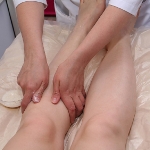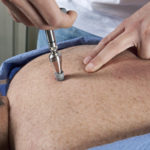When Is Massage Dangerous?
Is it safe for me to have my legs massaged even though I’ve had blood clots?
Andrew Weil, M.D. | August 29, 2011

An inflamed blood clot within a vein, usually in the leg, is called thrombophlebitis. Symptoms include redness, swelling, tenderness and pain along the course of a vein, which may be near the surface of the skin (superficial phlebitis) or deep within a muscle (deep vein thrombosis or DVT). Risks of forming these clots are increased by long periods of inactivity, such as when you’re confined to bed after surgery or sit for long stretches while driving or flying. Other risks include excess weight, pregnancy, taking birth control pills or estrogen therapy, a family history of a blood clotting disorder, varicose veins and smoking.
If you currently have a blood clot, massage is not advisable. I discussed your question with my medical partner, Brian Becker, M.D., who was originally trained as a massage therapist. Dr. Becker confirmed that you should not have deep massage when you have a blood clot, but agrees with me that a history of past blood clots is no reason to avoid massage. He notes that during massage, strokes on extremities (arms and legs) should always be toward the heart to assist venous return. He has observed that many therapists just stroke "back and forth" and seem to have missed or ignored this critical bit of information about physiology.
To prevent future blood clots, the best strategy is to exercise regularly to maintain and improve the strength of your circulatory system. Walking is ideal. In addition, the following approaches can help:
- Lose weight or maintain ideal weight.
- Follow a low salt, high fiber diet, such as my anti-inflammatory diet.
- Avoid either sitting or standing for long periods of time, and try to elevate your legs when resting. If you have to stand or sit for a long time, wear elastic support stockings.
- Consider oligomeric proanthocyanidins, or OPCs, extracted from grape seeds or pine bark. These antioxidant compounds are nontoxic free radical scavengers that may help support blood vessel integrity.
Andrew Weil, M.D.










